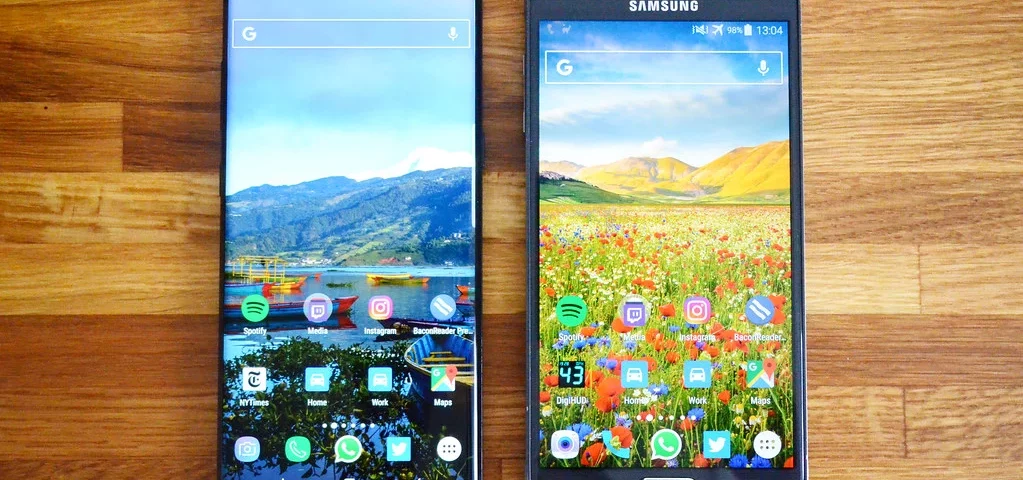


Why Choose We Fix All in Brampton for Your Cell Phone Repair
October 14, 2024


Sell Your iPhone in Brampton: Get the Best Price, Fast
November 12, 2025With so many different types of smartphones out there, arguments over operating systems can easily go over one’s head. The two major players out there are Apple’s iOS and Google’s Android; both have their avid followers. Which of the operating systems stands tall? We are going to break it down in simple terms through feature sets, usability, security, and a general experience comparison.
User Interface and Experience
iOS: Sleek and Intuitive
If you pick up an iPhone, you’ll notice immediately how minimalistic iOS is. Apple has a way of making technology accessible. The user interface is sleek and clean; anyone can just dive in and start using it with ease. Even those who are nontechnical find it quite approachable. And regular updates mean your device stays updated, even older models that can still get new features and security enhancements.
Android: Personalization at the Palm of Your Hand
Android, on the other hand, is an open playground for anyone who likes to tinker with their gadget. You have a whole slew of choices, from manufacturers like Samsung down to Google and OnePlus, each with different shapes, sizes, features, and user interfaces. Want to change the look and feel of your home screen or the way you interact with your apps? Android can do that. This kind of flexibility makes it extremely popular among tech enthusiasts and creative power users who want to make their phone truly unique.
Read Also: Repair vs. Replace: Which Is the Better Option for Your iPhone?
App Ecosystem
Quality over Quantity?
As far as apps go, both platforms have a big array to choose from, but the quality can be quite different. Most developers tend to release their applications onto iOS first, which usually means a better overall quality for that operating system. Most iOS applications are well-optimized and polished, providing an excellent experience for the user. What’s more, the App Store has quite a strict vetting process, and users are pretty safe when it comes to what they install.
But Android compensates for this with its much more varied selection of apps because of the open nature of the operating system. If you’re willing to look for it, there are many applications out there that can do very unique, very niche things. The flip side, of course, is that you get a greater selection, but the quality is sometimes not quite there, with some apps falling under in comparison with those on Apple’s platform.
Performance and Hardware
Apple: A Cohesive Experience
Because Apple designs both the hardware and the software for its phones, everything feels very integrated. Whether you’re using an iPhone, iPad, or Mac, everything works really well together. With features like Handoff and AirDrop, information and files are easily transferred between phones. If you’re already in the Apple ecosystem, that synergy is going to be a huge plus.
Android: Options for Every User
Where Android trumps its opponents is in the sheer number of devices that exist out there: super-affordable devices, high-end flagships, and everything in between. That ultimately gives you the capability to find a device that will meet your needs, whether it focuses on photography, gaming, or battery life. That diversity is also what tends to create a lot of inconsistencies. Not every Android phone is built or performs equally, so you may have to do a little more homework in finding one that will satisfy your expectations.
Security and Privacy
iOS: Built-In Protection
At Apple, there is a conscious effort in designing iOS with the user’s security in mind. From end-to-end encryption for messaging and calls to constant software updates that block devices from potential vulnerabilities, iOS is far more secure. The system being mostly closed makes it more difficult for malware to penetrate the App Store; thus, iOS is pretty safe for a large number of users.
Android: A More Complex Landscape
The case with Android is a bit more complicated. Sure, Google has surely beefed up its security over the years, with features such as Google Play Protect, fixes, and monthly patches, but the openness of it could also make it even more threatening. Not every device gets updates on time, especially older or budget versions. At the very end, it is users’ turn to be careful and well informed about their applications and their devices.
Conclusion: What’s Right for You?
Ultimately, the best operating system comes down to your personal needs and preferences. For a simple, no-fuss user experience with massive overtures in security, iOS might be the way to go. It can also be used if you need continuity between devices and strong application quality.
On the other hand, if you like tinkering around and want a phone that resembles your personality, then Android is perhaps what you need. The wide variety of devices and options means personalization can reach levels iOS just can’t match.
It comes down to what works for you at the end of the day: iOS or Android. Both carry strengths and weaknesses, but that core is finding a device that complements your lifestyle. Go with either an iPhone or an Android phone; all matters are that it feels right in your hands and does what you need it to do every day.

